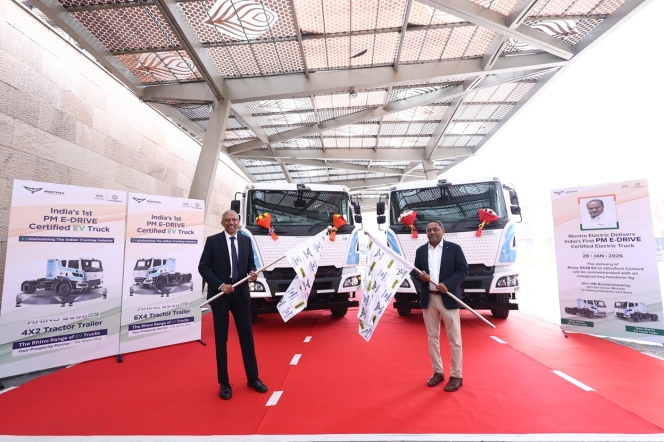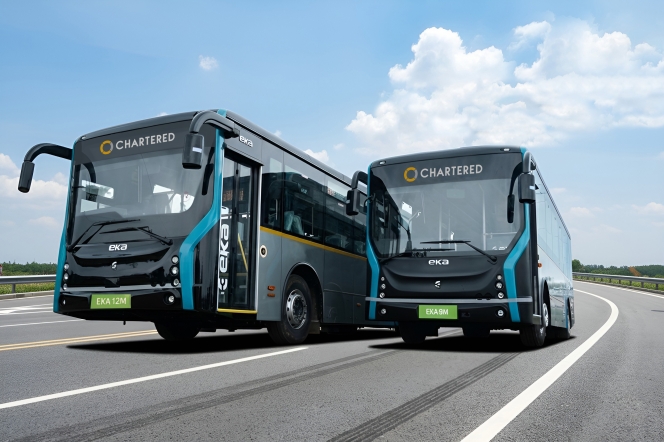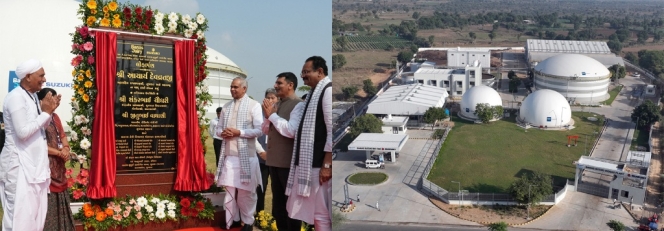EV Uptake Faster than Expected: Benling India
- By MT Bureau
- February 09, 2022

Electric Vehicles or EVs are an important resource for battling pollution and improving the lives and lifescapes of citizens, said Amit Kumar, ED and CEO, Benling India. It is, therefore, good to see the strong and visible focus the Union Budget 2022 puts on enhancing the use and operational availability of EVs in the country, he pointed out.
Kumar said, “While India’s electric vehicle market is expected to grow at a compounded annual growth rate (CAGR) of 90 percent to touch USD 150 billion by 2030, it may be safe to say that this market is still in its infancy. With EV sales accounting for barely 1.3 per cent of total vehicle sales in India during last year, the positive policy inputs such as those in the present budget and the shift to shared, electric, and connected mobility could help the country immensely in reducing harmful polluting emissions.”
He added, “The Union budget 2022 has proposed some very assertive measures which will promote the market for EVs across small towns and cities. There is an impactful thrust towards renewable energy incentives with an increased focus on reducing infrastructural waste for a greener tomorrow. This shall happen on the back of measures designed to overcome the hesitancy most buyers have when it comes to EVs. For instance, proposals for the furtherance of clean energy and the ‘Gati Shakti’ initiatives are important areas for the commercial EV segment. In fact, the demand incentives provided under FAME II, the launch of various state policies, the incidence of runaway and consistently rising fuel prices, tightening emissions laws, and increasing awareness about environment and its sustainability are few factors making the EV sector attractive to larger automobile players and financial investors.
“The sector is also witnessing some clear tech-led trends which will define its contours in the coming years. Smart charging where the infrastructure can manage need based charging and also charge itself will be a boon for countries such as India. Autonomy and self-driving cars have seen some big changes over the past couple of years and some movement can be expected in India as well. Increased bets on heavy-duty fuel cell vehicles should see this tech adoption take off soon too. Another trend is the introduction of EVs in different segments to accommodate consumer lifestyles. Alongside the EV trend is the growing dependence on using technology to enhance user experience and drivability. The movement away from analog indicators, switches and dials has been gradual: flat panel displays replace the variety of analog indicators, and touch screens replace the knobs, switches, dials and buttons. There is now a desire to integrate all these individual displays and touch panels as a contiguous surface. Solutions from innovative companies that do things in a different and better way will be the key to forging ahead. Customers want better, and there is a strong motivation in the industry to meet these expectations.”
He said, “Following the launch of the FAME India plan, which aims to transition toward e-mobility in the light of expanding international policy commitments and environmental difficulties, the EV market in India has gained substantial momentum. Additionally, India has the world's largest untapped market, particularly for electric two-wheelers. The automatic route market is likely to gain traction in the next few years due to the fact that 100 percent foreign direct investment is permitted in this sector.”
He also exuded confidence that with increasing demand and investments, the requirements for a skilled workforce in the EV sector can only be expected to grow. “An early identification and investment from government can ensure timely readiness and help capture the opportunity of green jobs that come along with the EV transition. Facilitating public and private investments into skilling, re-skilling, upskilling; research and development, especially for batteries; and innovation hubs at this stage will help reach the desired levels of preparedness for a just EV transition while ensuring local innovation and technology development,” he pointed out. (MT)
- Montra Electric
- Murugappa Group
- PM E-Drive Scheme
- Rhino 5538 EV 6x4 Tractor trailer
- Narendra Modi
- H D Kumaraswamy
- Arun Murguappan
- Sathia Raj
- UltraTech Cement
Montra Electric Becomes First OEM To Receive PM E-Drive Certification For Heavy Trucks
- By MT Bureau
- January 28, 2026

Montra Electric, the electric medium and heavy commercial vehicle business of the Murugappa Group, has become the first manufacturer in India to receive certification for heavy-duty electric trucks under the government's PM E-Drive Scheme.
To mark the achievement, the company delivered a Rhino 5538 EV 6x4 Tractor trailer to UltraTech Cement. The handover took place in the presence of Arun Murugappan, Chairman of Montra Electric and Sathia Raj, Chief Procurement Officer of UltraTech Cement.
The PM E-Drive scheme includes a budget of INR 5 billion specifically for electric trucks, providing a benefit of up to INR 960,000 per vehicle for the Rhino 5538 EV. This incentive is intended to lower operating costs and reduce exposure to fuel price volatility for fleet operators in the logistics, mining, and manufacturing sectors. The Rhino 5538 EV range is designed for Indian conditions and is available in 6x4 and 4x2 variants.
The Rhino 5538 EV 4x2 variant features a 282 kWh LFP battery that produces 380 HP and 2000 Nm of torque. It offers a range of approximately 198 km under standard test conditions and supports six-minute battery swaps. These specifications suit the vehicle for high-utilisation applications in ports, steel plants, and cement logistics.
H D Kumaraswamy, Union Minister for Heavy Industries, said, "The PM E-Drive scheme is a testament to the growing prowess of Indian innovation in the heavy-duty electric vehicle segment. Under the visionary leadership of Prime Minister Narendra Modi, we are committed to decarbonizing our logistics and making India a global hub for EV manufacturing. Electric trucks are pivotal to our Net Zero goals, and by fostering a self-reliant ecosystem through such certifications, we are driving the spirit of Atmanirbhar Viksit Bharat. We are very happy to see our Prime Minister’s vision coming to life with the 1st PM E-Drive certified heavy duty electric truck from 'Montra Electric' getting delivered today."
Arun Murugappan, Chairman, Montra Electric, said: “Decarbonising freight is one of the most critical challenges in India’s energy transition. We are grateful to the Government of India and our Prime Minister Narendra Modi for introducing forward-looking and progressive policy frameworks such as the PM E-Drive Scheme, which represent a welcome and transformative step in accelerating this shift, particularly in heavy commercial vehicles where emissions intensity is high. At Montra Electric, we are proud to contribute to this national mission by delivering technologically advanced, reliable, and scalable electric M&HCV solutions that can drive meaningful and lasting change in India’s mobility ecosystem.”
- Chartered Speed
- EKA Mobility
- PM E-Drive Scheme
- Bengaluru Metropolitan Transport Corporation
- Sanyam Gandhi
- Rohit Srivastava
- electric bus
Chartered Speed And EKA Mobility To Deploy 1,750 Electric Buses In Bengaluru
- By MT Bureau
- January 28, 2026

Chartered Speed and EKA Mobility have received a Letter of Confirmation of Quantity (LOCQ) to deploy 1,750 electric buses in Bengaluru under the PM E-Drive Scheme. This allocation accounts for approximately 39 percent of the city's total planned induction of 4,500 electric buses. The initiative is part of the Bengaluru Metropolitan Transport Corporation effort to expand its network in line with the decarbonisation roadmap of the Government of India.
The partnership combines the operational services of Chartered Speed with the vehicle manufacturing and technology of EKA Mobility. Operational protocols for the fleet include maintenance, battery monitoring, and driver training. Chartered Speed has stated its intention to transition 25 percent of its total fleet to electric power by Fiscal 2027.
The deployment aims to support public transport infrastructure in the region through investments in charging and maintenance facilities. Bengaluru is currently expanding its electric transport capacity to meet state mobility targets. The project focuses on providing urban transport solutions for the city's commuter base while reducing the carbon footprint of the public system.
Sanyam Gandhi, Whole-Time Director, Chartered Speed, said, “Bengaluru is a key mobility hub in India, and electric buses are part of the efforts to build a cleaner and more efficient public transport system. The PM E-Drive allocation strengthens Chartered Speed Limited’s long-term commitment to sustainable mass mobility. As one of the early adopters of e-mobility, we aim to convert around 25% of our fleet to electric by Fiscal 2027, supported by strong infrastructure investments to deliver commuter-centric services aimed at lasting socio-economic impact.”
Rohit Srivastava, Business Head & Chief Growth Officer, EKA Mobility, added, “The PM E-Drive initiative is a powerful enabler of India’s electric mobility vision, and Bengaluru’s large-scale adoption of electric buses sets a strong benchmark for urban transport transformation. At EKA Mobility, we are proud to partner with Chartered Speed and contribute to Bengaluru’s journey towards a more sustainable urban future. It is not just about scale, but about creating cleaner mobility solutions, quieter streets, and a better daily commute for millions.”
Suzuki Opens Second Biogas Plant In Gujarat
- By MT Bureau
- January 20, 2026

Suzuki Motor Corporation and its subsidiary, Suzuki R&D Centre India (SRDI), have inaugurated the Banas Suzuki Biogas Plant in Bhukhala, Gujarat. The facility, which opened on 18 January 2026, is the second such plant following the Agthala site that commenced operations in December 2025.
The plant is designed to process up to 100 tonnes of cow dung per day to produce approximately 1.5 tonnes of biogas. This output is equivalent to the daily fuel requirements of 850 compressed natural gas (CNG) vehicles. In addition to fuel production, the facility will sell organic fertiliser generated as a byproduct of the process.
The project is part of an agreement signed in September 2023 between SRDI, the National Dairy Development Board (NDDB) and Banas Dairy. The partners have agreed to construct a total of five biogas plants in the region. The Bhukhala site covers an area of 27,000 square metres and forms a component of Suzuki’s strategy to support carbon neutrality in India.
The use of biogas serves as a carbon-neutral alternative for CNG vehicles, which currently represent 20 percent of the Indian passenger car market. Beyond emission reductions, the initiative is intended to improve energy self-sufficiency and increase rural income through the purchase of cattle waste from local farmers.
The opening ceremony was attended by Acharya Devvrat, Governor of Gujarat and Shankar Chaudhary, Chairman of Banas Dairy and Speaker of the Gujarat Legislative Assembly. Representing Suzuki was Kenichiro Toyofuku, Managing Officer and Executive General Manager of Biogas Operations.
The company stated that it will continue to develop its biogas business to contribute to national growth and environmental targets. The operation is expected to create jobs within the district while providing fuel for high-demand vehicle segments.
Bajaj Auto Rolls Out Early Incentive Offer For Chetak C25 E-Scooter
- By MT Bureau
- January 19, 2026

Pune-headquartered two-wheeler and three-wheeler major Bajaj Auto has started sales of its recently introduced Chetak C25 e-scooter across its showrooms in India. Following the model's unveiling earlier this week, the company has positioned the vehicle to target urban commuters. The scooter is priced at INR 91,399 (ex-showroom Delhi), with an introductory benefit of INR 4,299 available for the first 10,000 customers, bringing the effective price to INR 87,100.
The Chetak C25 features a 2.5 kWh battery providing a certified claimed range of 113 km. It is constructed with a metal body and a mono-body design intended for durability in city environments. Technical specifications include a 25-litre storage compartment, disc brakes, hill hold assist, and guide-me-home lighting. The vehicle’s proportions are designed for agility in dense traffic.
The introduction of the C25 completes the Chetak portfolio, which now includes the 30 and 35 Series. Bajaj is marketing the model to first-time electric vehicle buyers and households requiring a secondary scooter for short trips. Deliveries have commenced alongside the showroom roll-out in major cities.
The C25 is supported by the existing Chetak service network. The company noted that the launch and early-bird offer are intended to address customer interest in accessible electric mobility solutions that focus on reliability and ease of use.
The e-scooter maintains the brand's focus on material quality through its use of metal surfaces rather than plastic panels. It is engineered to align with daily commute patterns and offers various colour options. The mechanical framework is built to provide stability and a refined presence on the road while maintaining a compact footprint.







Comments (0)
ADD COMMENT